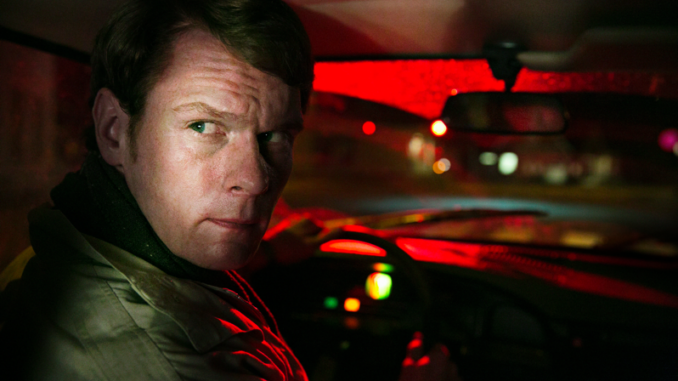
The camera rests on a snowy wasteland, the foreground gently receding. A plane appears out of the corner of the frame, soars indifferently over the landscape, and then erupts in billows of flame. This sequence, appearing early in Christina Rosendahl’s political thriller, represents the pivotal moment in 1968 when a US plane carrying four nuclear bombs crashed over the Thule Air Base in Greenland, which at that time was part of Danish territory. The radiation resulting from the blast contaminated many of those employed to help with the clean-up operation – a fact seemingly concealed by the Danish and US authorities, and something the film’s eponymous journalist, Poul Brink, determines to uncover.
The film is predominantly set in the 80s, following Brink’s attempts to secure justice for the Danish workmen affected by the radiation, and to peel off the layers of concealment and lies touted by the allied governments. Brink, played with an expression of admirable steeliness throughout by Peter Plaugborg, slots tidily into the clichéd film role of whistleblowing journalist who’s bitten off more than he can chew. The slight hollowness at the centre of his character is, nevertheless, a savvy move on the part of the filmmakers, ensuring that Brink’s personal baggage doesn’t clutter an already complicated and engaging historical narrative.

In other ways, however, the film doesn’t quite deliver on the electrifying promise indicated by the opening sequence. The film unravels into a more conventional thriller than its scatterings of real documentary footage would suggest, and the plot development is uneven. It’s organised as if the filmmakers didn’t know what was going to happen, a scatter-gun narrative causing it to lose much of its momentum, with certain incidents left unexplained or unjustified by the end of the film. This flabbiness isn’t helped by the fact that the film’s plot largely revolves around a series of telephone conversations of increasing intensity and chin-stroking, a repetitiveness that eventually grows tiring.
Similarly, characters are flung in only to be withdrawn after a couple of scenes, making it difficult to believe that the events have any significance to anyone other than the idealist of the title. Indeed, this is partially the point; the film sets itself up as an investigation into the murky cover-up, but this falls away towards the end as the film refocuses its attention on to the nature and value of truth. Nevertheless, the suggestion of the ultimate irrelevance of all of this whistleblowing in the latter stages of the film is somewhat jarring, and the more philosophical elements of the film aren’t dealt with in enough subtlety to redeem this fact.
However, the icy visuals and strong backbone to the film proffered by what is a genuinely interesting piece of political history make it an engaging thriller, even if it is a bit lacking in thrills.
3***
by Sibylla Archdale Kalid

Leave a Reply